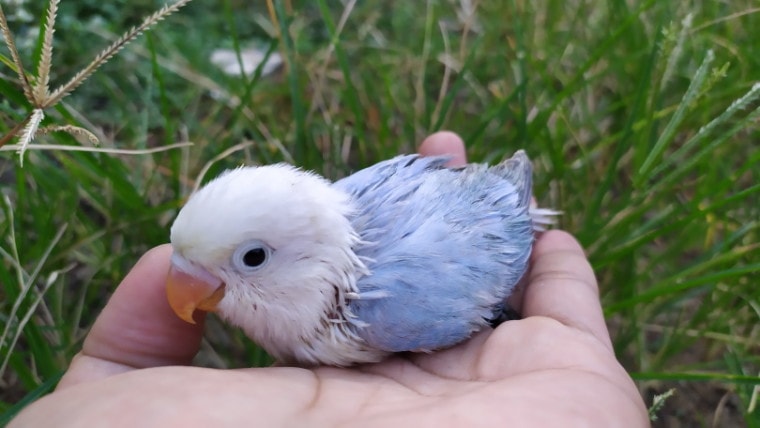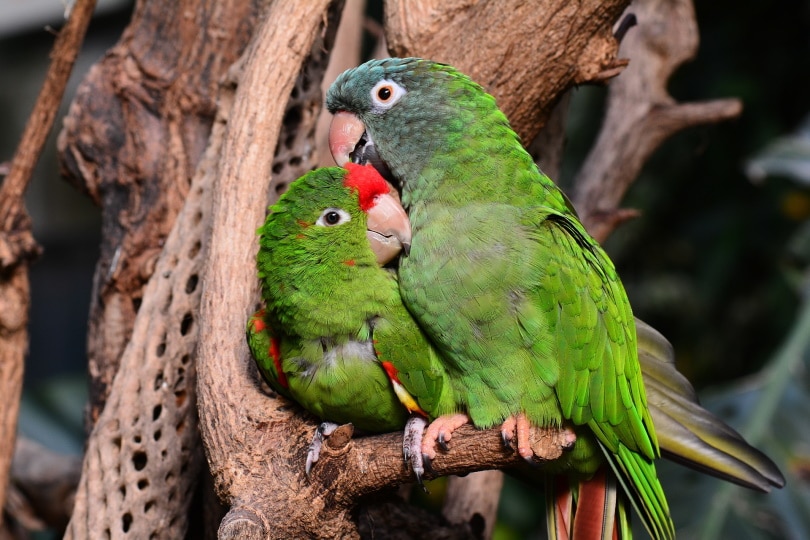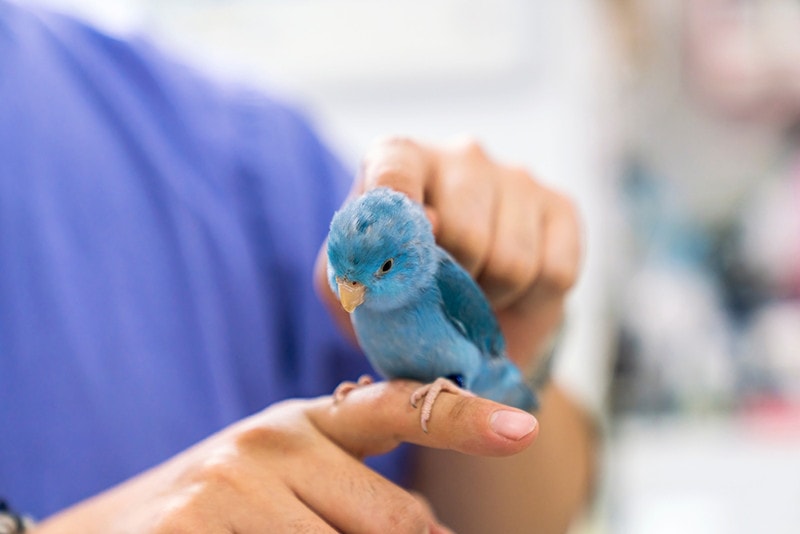
Taking care of baby lovebirds can be very difficult. When young, they are not especially hardy. Feeding them incorrectly or keeping them at the wrong temperature can easily lead to the death of a baby lovebird.
There are circumstances where lovebird parents may be unable to take care of the babies. Some inexperienced parents simply don’t know what to do and may even end up not caring for their babies properly.
If you’ve ended up with a baby lovebird for whatever reason, we’ll take a look at how to properly care for lovebird babies.
The 4 Tips to Take Care of Baby Lovebirds
1. Wait for the Eggs to Hatch

If you’re planning on hand-raising your baby lovebirds, you’ll likely be keeping a close eye on the eggs. You will need to be there when they hatch, so it is essential that you notice the signs of impending hatching.
Lovebirds tend to lay many eggs after mating, but most don’t hatch. In fact, only about 10% to 20% of a clutch will hatch. Sometimes, none of them hatch at all. Occasionally, the mother may lay dozens of eggs before one hatches.
There are many signs that lovebird eggs may be about to hatch. The eggs will start out as white and then slowly change to grey. This will begin slowly, changing from a light grey to darker grey over time. This is a sign that there is a baby growing inside the egg. Only eggs that are actually fertile will turn to a very dark grey color.
The mother will incubate the eggs for about 23 days. You should count from the day that the mother began sitting on the eggs. The mother will usually sit on them continuously. She won’t move and may appear fluffier than normal as she tries to keep the eggs warm and toasty. She will likely become aggressive as well. Sometimes, the bird will even be aggressive towards the male when he comes to feed her.
Right before the eggs hatch, you will hear small crying sounds from inside the egg every now and then. This assumes the mother is letting you get close to the eggs, as they are often very territorial at this point. You shouldn’t have to do anything with the actual hatching process. Allow the babies to hatch as they are able.
2. Caring for Newborn Lovebirds

Newborn lovebirds need a lot of care. They are very small and delicate at this age, so they aren’t able to adjust to mistakes. For this reason, we highly recommend not attempting to care for newborns by hand-rearing them unless you are already experienced or have a vet you can call for help if necessary. Their survival rate is much better if left with their parents.
The newborn should be placed in a nesting box. Two unhatched eggs should be used for support, as the baby shouldn’t be allowed to roll around much at this stage. They need support, and the eggs provide that support.
Feeding
You should allow the female to feed the baby as she sees fit. You should notice her bringing the baby food in her beak. She will bring the baby whatever you provide her, so be sure you’re giving high-quality food items. Things like corn, apple, seeds, banana, and spinach are all good options at this stage.
If you’re hand-rearing the babies, you will need to provide a formula. You should make it thin, but not so thin that the babies aspirate on it. You’ll need to check the baby’s crop to ensure that it is full. This is how you ensure that the baby is getting enough to eat.
Feed the baby with a syringe, ensuring that it is warm but not hot. It should be just below body temperature to prevent burns.
Temperature
Warmth is also necessary for the lovebird’s health. The baby should be kept at around 88 to 92 degrees F. Generally, the mother will take care of this. However, we do recommend covering the cage with a pillowcase in the summer or a baby blanket in the winter. This will help ensure that the baby is kept warm enough and prevent drafts.
You should use a brooder to keep the lovebird warm if the mother is not caring for the babies.
Dirt & Noise
Cleanliness is essential to prevent disease, as baby birds are susceptible to infection. You should spot-clean the cage daily and provide fresh food regularly. Newspaper is a great option for the bottom of the cage. The female will shred some of this for the nest, but it is also very easy to spot clean.
Otherwise, keep the area around the cage peaceful and quiet. You don’t want to stress out the parents or the babies at this stage. Stressed parents may not care for the babies properly. It may also interrupt the baby’s sleep, which can affect their health.
3. Supporting the Parents

In many cases, the babies should be kept with the parents. While hand-raised babies may be friendlier at first, you can tame any bird once it gets older. Leaving the baby with parents that are taking care of it properly will likely result in better outcomes than hand-rearing. Lovebirds evolved to take care of their children.
The parents should remain well-fed. Don’t switch their diet around much from what it is before, as this can cause unnecessary stress. Freshwater should be provided at all times, as should high-quality food. Be sure to clean the water daily to prevent illnesses for both the parents and the baby. Clean the bowls thoroughly each time you change them.
Cover the cage’s base with paper. The female will enjoy tearing it up to line the nest, which is also important for the baby’s wellbeing. It is also much easier to spot-clean, which you should be doing at least daily. Preferably, you should be checking the cage multiple times a day and cleaning it as necessary.
Provide the parents with attention and ensure that you socialize with them as normal. If they become bored or frustrated, they may develop stress-related behaviors. They may be particularly prone to these while caring for a baby, so it is important that you aim to support them as much as possible during this difficult time.
When the baby gets older, you should let the parents out for playing, assuming this was their routine previously. The parents may get a bit distracted while out, so don’t keep them out of the cage for very long. Otherwise, the babies may suffer. Of course, by the time the babies are two weeks old, they only need to feed every 4-6 hours. Therefore, the adults should be perfectly fine being out of the cage for a bit.
Your lovebirds should be getting at least 12 hours of rest time at night. Be sure to darken the room during this time so that they can sleep. Otherwise, they may become stressed due to sleep deprivation. They will awaken and feed the baby as necessary at night on their own.
4. Accept That It Doesn’t Always Workout
Sometimes, despite doing everything as perfectly as possible, some of the lovebird babies will not survive. Occasionally, a baby will be born too weak to do much at all. Other times, the parents will make a mistake in their baby’s care. Infections and similar issues are also common, but the baby may pass so quickly that they don’t show symptoms.
When a baby passes away, you don’t always know the cause. Often, a baby will just not seem to thrive and pass after a few hours. Other times, the baby may suddenly go downhill. You can guess why the baby didn’t make it, but even vets usually can’t tell for sure.
Many people will lose multiple babies. Just as many babies may pass away as survive. In some cases, a whole brood will pass away without warning. This is most common with inexperienced parents, as they are usually not very good at taking care of their babies. Most birds will lose their first few babies, so prepare emotionally.
 Final Thoughts
Final Thoughts
A baby lovebird is always an exciting time. However, it can also be stressful. In many cases, it may not work out as well as you may hope. Many babies do not make it – and not because of anything the owners do. There are many reasons why a baby may not survive. We highly recommend not breeding your birds together unless you can deal with a few babies passing away.
There are many things you can do to ensure the baby’s success, though. Supporting the parents and crafting a good environment is paramount. You should keep things calm and quiet. Spot-clean the cage regularly to prevent diseases and provide the highest quality food possible. Keep an eye on the baby, but understand that there isn’t actually much you can do in most cases.
Hand-rearing has become more popular in recent years. These birds grow up tame, so they are often friendlier. However, this is a huge responsibility. If you aren’t experienced or have access to someone who is, it is likely that the bird will be better off with the mother—even if she is inexperienced herself.
You May Also Like:
- Male or Female Lovebird? How to Identify the Differences
- 9 Types of Lovebird Species (with Pictures)
Featured Image Credit: fandy eka nanda, Shutterstock







